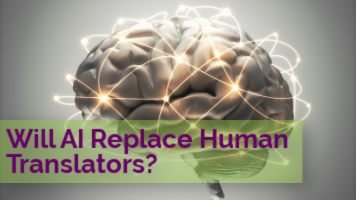Blog

Lost in Translation: How TV and Movies Get Language Services Wrong (and Sometimes Right)
We’ve all been there. You’re watching a courtroom drama, and the lawyer yells “Objection!” every five seconds. Or a medical show where someone flatlines and the doctor yells “We’re losing him!” while pounding on the chest like it’s a bongo drum. Real professionals cringe—and for good reason. Just like doctors, lawyers, and cops, interpreters and…

Life expectancy in the U.S. fell by 1.5 years in 2020, the biggest decline since World War II, according to new data from the Centers for Disease Control and Prevention (CDC). What does it all mean for the future? Overcoming language barriers in healthcare – whether it be Limited English Proficient patients or deaf/hard-of-hearing individuals – is more crucial than ever. Here are the top 5 video translation services in healthcare that help overcome language barriers and improve patient satisfaction. 1) Video Remote Interpreting (VRI) Video Remote Interpreting tops the list of the top 5 video healthcare translation services. It is…
Read More >>American Sign Language (ASL) is a visual-gestural language used by members of the Deaf community in the United States and Canada. It is a complete language, with its own unique grammar, syntax, and vocabulary, and is not simply a visual representation of English. ASL is used to communicate through the use of hand gestures, facial expressions, and body language, and is a rich and vibrant language that has a long and fascinating history. In this blog post, we will explore what ASL is, its importance to the Deaf community, American Sign Language interpreting services, and the benefits of learning and…
Read More >>We have all seen the Google Translate fails. They are often innocent and good for a chuckle. However, in the grand scheme of things, machine translation has improved drastically and is pretty useful depending on the context. With the rise of ChatGPT and other more sophisticated tools, one question is asked more often: Will AI replace human translators? Some might find that question silly, but consider this: Memsource CEO David Čaněk said during SlatorCon (an event hosted by language-industry leading authority Slator) that 2020 marked the first year Post-Edit Machine Translation (PEMT) was the dominant method of translation. That development…
Read More >>Meet Dana Camp. Dana is the Director of Information Technology at Interpreters and Translators, and he answered a few questions for us. We hope you’ll enjoy getting to know him! Tell us a little bit about your work background before you came to Interpreters and Translators, Inc. My passion for tech started early on. When I got my driver’s license, I started getting clients who need computer help. The homeowners and small offices I supported were my first stop on building a professional career, but I didn’t know it at the time. In college, I worked in a computer tech…
Read More >>“We need a translator for an appointment next week.” “Do you have a Spanish interpreter to help with my documents?” These are questions we hear all the time when speaking with clients. While using “interpreter” and “translator” interchangeably isn’t exactly an insult, it is incorrect. Although many people use the terms synonymously, the actual professions and skillsets needed for translators vs. interpreters couldn’t be more different! Interpreters work with the spoken word. Whether they are on-site with a client or appearing via telephone or video, they are performing their job in real time. Interpreters are used daily for business meetings,…
Read More >>Many individuals in underserved communities face language barriers that prevent them from receiving services critical to their wellbeing, understanding their rights, and accessing opportunities. For more than thirty-five years, Interpreters and Translators, Inc. (iTi) has been helping those who serve these communities break through those barriers. The Importance of Translation and Interpreter Services for Schools and Other Community-Based Organizations According to the U.S. Census Bureau, as of 2019, 67.8 million people speak a language other than English at home. A large percentage of people in underserved communities fall into this category and may be Limited English Proficient (LEP). Many are eligible for…
Read More >>Artificial intelligence has become one of the hottest topics being discussed in business circles recently. More people and companies are using A.I. as a translation tool. While A.I. can be useful as a starting point for basic translations, it falls short when it comes to localization. In this article, we will examine the question of human localization vs. artificial intelligence. What is Localization? Localization is the process of making something local in character. This includes more than just translation; it involves adapting content to the target market’s culture, customs, beliefs, and preferences. Cultural fluency is at least as important as linguistic…
Read More >>The cultural fabric of the United States is changing more rapidly than ever before. As the make-up of the American population continues to change, so do the methods healthcare providers use to raise the bar when it comes to serving patients. If you are reading this article, you are probably aware of the importance of the Hospital Consumer Assessment of Healthcare Providers and Systems Survey, or(HCAHPS), and its impact. According to the last U.S. Census Bureau survey in 2020, 68 million people speak a language other than English at home. As our country’s population continues to diversify, so does the…
Read More >>FAQ -Language Access Services for Healthcare If you’re looking for healthcare interpreting or translation services, you likely have some questions. Fortunately, as a healthcare interpreting company serving hospitals and healthcare systems for over 35 years, we at Interpreters and Translators, Inc. have heard them all. Below, we’ll answer some of the most frequently asked questions about language access services for Healthcare organizations. Be sure to bookmark this page for future reference! General Healthcare FAQs Q: Are healthcare providers required by law to provide language services? A: If your facility receives federal funds, it is legally required to…
Read More >>Interpreting is important. So is translation. Interpreting – the spoken word. Translation – the written word. As a healthcare provider, you already know that communication is the key to excellence in the patient experience. For your non-English-speaking patients and their families, medical scenarios can be confusing and even frustrating. You’re taking steps to make sure that medical interpreting services are available to those who need them. Are you making the same effort when it comes to translation of your written communications? Here are some dos and don’ts to consider when seeking medical translation services. What should you be translating? But…
Read More >>









